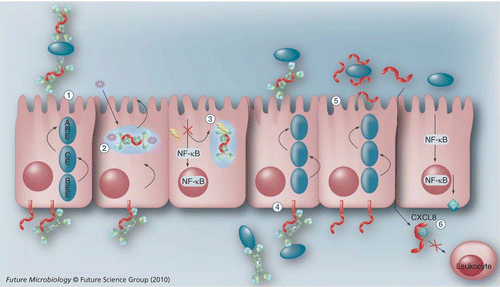Boost Your Immunity Via The Gut
Do you feel like you’re susceptible to getting sick all of the time?!
SIgA might be your answer…
Secretory Immunoglobulin A or SIgA is a stool test marker of gut immune function.
SIgA serves as our first line of defense in protecting our intestinal epithelium from both pathogenic microorganisms like E Coli and toxins like Glyphosate.
SIgA influences and supports intestinal homeostasis ie a happy balance of good and bad bacteria :).
How would I know if I have a low or high SIgA?!
Signs of low SlgA: Low SIgA is typically a sign that your gut immune function is low/under active and needs support! This is common after years of chronic high stress from things like toxin load, infections, bacterial overgrowth in the gut, emotional trauma or a high perceived stress load that was improperly managed. It’s common to get sick often or feel like you have a poor immune system when SIgA is low.
Signs of High SIgA: High SIgA is common in individuals who have an ACTIVE or acute infection, autoimmunity, virus or chronic inflammatory condition like IBD. It’s also common in those who are struggling with a high level of gluten sensitivity. This is typically a sign that the immune system is triggered and reactive-it’s telling us, HEY, there’s something going on here I’m fighting! The good thing is that the immune system is reacting as it should (which is better than a low SIgA) but the thing to note here is there is usually something triggering it that warrants treatment or support!
OK, so what’s the take home message here? Supporting a healthy gut immune system (via a healthy SIgA) is key to optimal immunity and healing the gut. Use my immunity boosting tips below to support a healthy SIgA level.
Interested in getting your SIgA level tested via stool testing by becoming a private client of mine?! You can schedule a complimentary consult call with me here.
Boosting Your Immunity Via The Gut:
Choose Immune-Supportive Foods:
Eat whole food forms of vitamin C (red bell peppers, strawberries, goji berries, camu camu powder, kiwis and, citrus), animal-based vitamin A (beef liver, goat dairy, egg yolks, ancestral blends of beef/bison), zinc-rich foods (oysters and pumpkin seeds)
Choose food vitamin C vs. synthetic forms like ascorbic acid which can hinder mineral absorption and aren’t well absorbed
Prioritize Essential Fatty Acid-Rich Foods:
Eat SMASH foods (sardines, mackerel, anchovies, salmon, herring)
Shoot for these foods 2-3x/week
High Quality Proteins:
We need adequate protein to MAKE immunoglobulin A! Sometimes just protein deficiency in your diet can cause you to have depleted SIgA.
Think mineral-dense animal proteins like grass fed beef, wild salmon, shellfish like shrimp, oysters and mussels and, egg yolk.
Pro tip: Those with low stomach acid (again, something we look at it functional stool testing) can have a harder time absorbing protein when stomach acid levels are optimized. This is common in those with H pylori infection, autoimmune conditions, chronic NSAID users, those with a significant birth control pill use history and those with a history of SIBO. Some s/sx can be frequent burping after eating, bad breath, chronic B12 deficiency, food sitting too long after eating, undigested food in stool, constipation and anal itching
Mineral Dense Foods/Bevs:
My OG mineral mocktail, high quality salts, beef liver, shellfish, tropical fruits and, starchy root veggies.
Bitter Foods:
Bitter Foods like radish, radicchio, endives, watercress, dandelion greens, broccoli sprouts and cranberry to feed and boost your good gut commensal bacteria.
->Pro tip: High quality Beef Liver and Cod Liver Oil can be supportive supplemental ways to get more of the nutrients above as well!
Lifestyle:
Slow down, integrate more rest into your life, start your morning off slower.
Prioritize the heck out of quality sleep - you can do this by keeping consistent wake and bedtimes, blocking blue light at night and morning light exposure upon waking in the AM.
Minimize/avoid things that cause more gut irritation and susceptibility to sickness like alcohol, lots of caffeine, high intensity workouts/training and traveling.
More Tips For Stress Reduction For Those With Busy Lives:
5 minutes of cathartic sighing (I have a guided video in the Breath Work For Gut Health Starter Pack).
Breathe at all meals using my Rule of 3’s: 3 breaths, 3 times before and during meals
A 5 minute walk after lunch in fresh air
Red light exposure at night time
Avoid caffeine on an empty stomach
Eat breakfast (even a small one) within 1-2 hours of waking
Silent practices: Doing more things silently without extra stimulation (if you’re constantly on the phone/listening to podcasts/watching TV, can you do LESS multitasking?!)
Make your cup of tea without distractions and take an extra moment to savor it
Pull back on high intensity exercise-consider pilates, yoga or walking and focus on integrating your breath
Notice if you can do your activities with an air of SLOWNESS - a rushed lifestyle can hinder gut healing
Go on a phone-less walk or hike in nature
Connect with your partner silently
Pet a furry friend
Additional Supplemental Support - There are certain supplements like Saccharomyces boulardii as well as colostrum and bovine immunoglobulins that have been shown to be supportive in cases of low SIgA. I recommend working with a functional medicine dietitian/doc for appropriate dosing of these!
Interested in getting your SIgA level testing via stool test by becoming a private client of mine?! You can schedule a complimentary consult call with me here.
References:
Li, Y., Jin, L., & Chen, T. (2020). The Effects of Secretory IgA in the Mucosal Immune System. BioMed Research International, 2020, 1–6. https://doi.org/10.1155/2020/2032057
Pietrzak, B., Tomela, K., Olejnik-Schmidt, A., Mackiewicz, A., & Schmidt, M. (2020). Secretory IgA in Intestinal Mucosal Secretions as an Adaptive Barrier against Microbial Cells. International Journal of Molecular Sciences, 21(23), 9254. https://doi.org/10.3390/ijms21239254
Singh, K., Chang, C., & Gershwin, M. E. (2014). IgA deficiency and autoimmunity. Autoimmunity Reviews, 13(2), 163–177. https://doi.org/10.1016/j.autrev.2013.10.005


